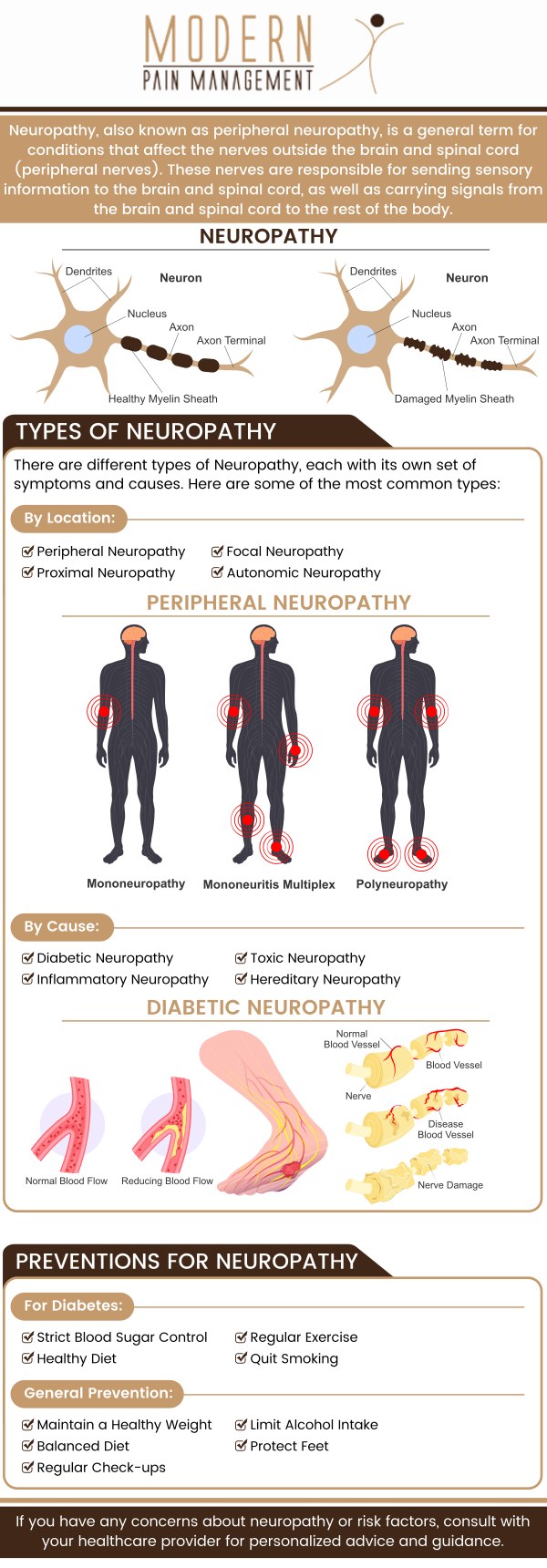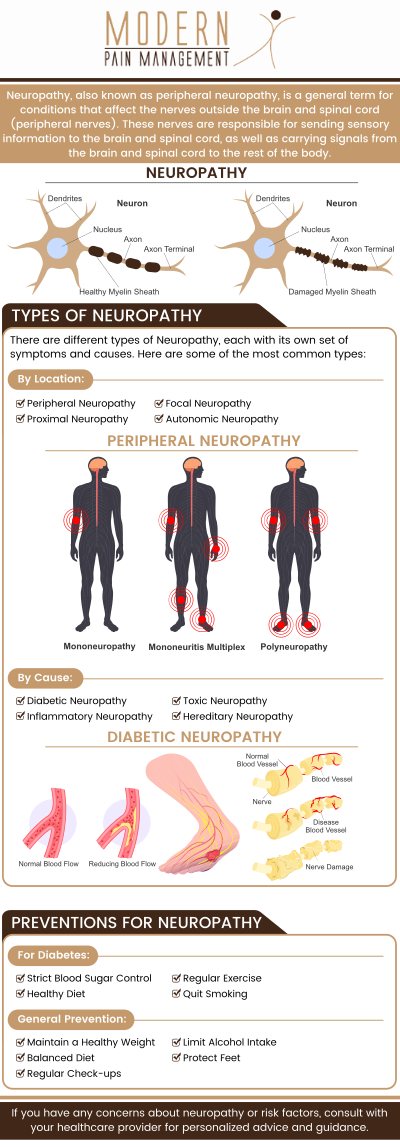Understanding and Managing Neuropathy in Feet
Is neuropathy in your feet affecting your daily life? You don’t have to suffer in silence. At Modern Pain Management, Dr. George Atallah, D.O., and our compassionate team offer specialized care to address and manage foot neuropathy effectively. Contact us now or book your appointment online to discover how we can help you find relief. We have convenient locations to serve you in Houston, TX, and Sugar Land, TX.




Table of Contents:
How long does foot neuropathy take?
What are the dos and don’ts of foot neuropathy?
What makes foot neuropathy feel better?
How do I live with neuropathy in my feet?
Is it good to walk with neuropathy in your feet?
Can Dr. George Atallah help me find relief from foot neuropathy?
Whether the neuropathy is acute (sudden and short-lived) or chronic (prolonged and persistent), our team of experienced pain management specialists understands that the timeline of foot neuropathy can differ greatly from patient to patient, depending on several factors such as the underlying cause, the severity of nerve damage, the patient’s overall health condition, and the treatment methods implemented.
At Modern Pain Management, we approach each patient’s condition with a personalized treatment plan. This can involve medications, physical therapy, lifestyle modifications, and nerve stimulation therapies.
We are also aware of the importance of regular medical follow-ups to monitor progress and adjust treatment strategies accordingly. We encourage you to seek medical attention at our clinic as soon as possible.
Foot neuropathy, also known as peripheral neuropathy, is a debilitating condition that results in damage to the nerves in the feet. We understand how critical managing foot neuropathy is to contain the severity of the symptoms and prevent further nerve damage.
Do’s for Foot Neuropathy
• Maintain good foot hygiene: Always keep your feet clean and dry. Use warm water and mild soap to clean them, and ensure they are dried thoroughly, especially between the toes.
• Inspect feet regularly: Regular foot inspections are essential. Be vigilant for any sores, cuts, or blisters that might not cause pain due to the numbness associated with foot neuropathy.
• Exercise regularly: Regular physical activity is a vital part of managing foot neuropathy. It can improve blood flow, reduce neuropathy symptoms, and help control blood sugar levels if you have diabetes.
• Manage blood sugar levels: If your neuropathy is caused by diabetes, maintaining healthy blood sugar levels is crucial to prevent the condition from worsening.
• Eat a balanced diet: A balanced diet rich in vitamins, particularly B vitamins, is essential for nerve health. Discuss with our team about dietary supplements like vitamin B12 and alpha-lipoic acid to support nerve function.
• Protect feet from injury: Always wear comfortable, well-fitting shoes to prevent foot injuries.
• Get regular foot exams: Schedule regular checkups with our team at Modern Pain Management to monitor your foot neuropathy and address any concerns.
• Quit smoking: Smoking can worsen foot neuropathy by decreasing blood flow to the feet.
Don’ts for Foot Neuropathy
• Expose feet to extreme temperatures: Avoid exposing your feet to extreme hot or cold temperatures as your altered sensation might not alert you to potential burns or frostbite.
• Sit or stand for extended periods: This can exacerbate swelling and numbness, worsening your symptoms.
• Ignore foot problems: Do not overlook any foot injuries, no matter how minor they might seem. Our team at Modern Pain Management can provide prompt treatment to prevent infections.
• Self-treat: Do not attempt to treat foot neuropathy on your own. Always consult with our qualified healthcare professionals for proper diagnosis and treatment.
• Consume excessive alcohol: Alcohol can interfere with nerve function and worsen symptoms.
• Use over-the-counter pain relievers without consultation: Some nonsteroidal anti-inflammatory drugs (NSAIDs) can increase inflammation and worsen neuropathy. Always discuss with our team before starting any new medication.
• Wear tight-fitting shoes: Tight shoes can compress nerves and cause discomfort.
• Skip medications or treatments: Never skip medications or treatments prescribed by our doctors at Modern Pain Management, even if you feel better. Foot neuropathy is a chronic condition that requires consistent management, and stopping treatment may worsen your symptoms or cause complications.
At Modern Pain Management, we understand the complexities of foot neuropathy, also known as peripheral neuropathy. This condition, characterized by nerve damage in the feet that results in symptoms such as tingling, numbness, burning, and pain.
While foot neuropathy is often associated with diabetes, it can also be caused by various other factors including injuries, infections, exposure to toxins, and nerve compression conditions like tarsal tunnel syndrome or Morton’s neuroma. Regardless of the underlying cause, our approach to managing foot neuropathy involves a combination of lifestyle modifications, medication, physical therapy, and, if necessary, alternative treatments.
We may also prescribe medications such as antidepressants or anticonvulsants, which interfere with the chemicals in your brain that make you feel pain.
We can also provide physical therapy to improve strength, flexibility, and balance, and occupational therapy to help you adapt to any changes in your ability to perform daily activities. Other treatments we may recommend include Transcutaneous Electrical Nerve Stimulation (TENS), massage therapy, and even alternative treatments such as acupuncture, biofeedback, and stress-reducing activities like yoga or meditation.
We understand that living with neuropathy in your feet can significantly impact your overall well-being. This condition, characterized by nerve damage, can affect your foot function and overall quality of life. However, our team of dedicated and experienced specialists can guide you to manage this condition effectively.
Neuropathy in the feet can arise from various factors, including diabetes, alcoholism, vitamin deficiencies, autoimmune disorders, genetics, and infections. Its symptoms typically include numbness and tingling, burning or stabbing pain, hypersensitivity to touch, muscle weakness, and loss of sensation in the feet.
Your medical treatment at our clinic will involve controlling any underlying conditions, prescribing medications to relieve pain, and supplementation with vitamin B12 and alpha-lipoic acid. If your pain is mild, over-the-counter pain relievers such as nonsteroidal anti-inflammatory drugs may be recommended. However, for more severe cases, our doctors may recommend prescription medications, topical creams, or patches.
Beyond medical treatment, lifestyle modifications are crucial. Regular cleaning and inspection of your feet will be encouraged to prevent infections, sores, or ulcers. You will be advised to avoid prolonged standing or walking, manage your weight, and wear supportive shoes to reduce extra pressure on your feet.
In addition, we will help you incorporate regular low-impact exercises into your routine to improve blood circulation and contribute to nerve health. Our physical therapy services, including strengthening exercises, stretching, and transcutaneous electrical nerve stimulation (TENS), can improve muscle function, enhance flexibility, and block pain signals.
As part of our comprehensive care, we provide resources and support for coping mechanisms like using assistive devices, protecting feet from injury, elevating feet when resting, managing stress, and joining support groups.
Our team will also guide you on maintaining proper nutrition, especially a diet rich in vitamins, and lifestyle changes such as quitting smoking and limiting alcohol intake to support nerve health. At Modern Pain Management, we are committed to providing personalized care and advice to ensure effective management of your condition.
Living with neuropathy in the feet is a long-term commitment to self-care and management. By implementing effective strategies, you can mitigate the symptoms and improve your quality of life. Despite neuropathy, you can lead a fulfilling, active life with our assistance.
Walking can provide significant benefits for patients suffering from neuropathy, a condition we often treat at Modern Pain Management. Neuropathy is a chronic condition characterized by nerve damage, frequently leading to symptoms such as numbness, tingling, burning, and pain in the feet. Despite these symptoms, walking can be beneficial if done correctly and with the proper precautions.
Benefits of Walking with Neuropathy:
At Modern Pain Management, we recommend walking for the following reasons:
• Improved circulation: Walking can stimulate nerve growth factors and improve nerve function, promoting blood flow to your extremities.
• Pain relief: Regular, gentle physical activity like walking can improve circulation, reduce pain, and slow the progression of the condition.
• Reduced inflammation: Walking can help reduce inflammation throughout your body.
• Strengthening of muscles: Walking helps strengthen the muscles in your feet and legs, providing better support for your nerves.
• Improved balance and coordination: Walking exercises improve balance and coordination, which can help prevent falls and injuries.
• Mental health benefits: Physical activity, including walking, has been shown to improve mood and reduce stress, which can positively impact the experience of neuropathy.
• Manage blood sugar levels: Walking can also help manage blood sugar levels, a critical factor for individuals with diabetic neuropathy.
Cautions:
While walking can be beneficial for neuropathy, it’s important to proceed cautiously:
• Start gradually: Begin with short walks and gradually increase the distance and intensity as tolerated.
• Choose appropriate footwear: Wear comfortable, supportive shoes with good cushioning to protect your feet. Check your feet regularly for any injuries or abnormalities.
• Listen to your body: If walking causes pain or discomfort, stop and rest.
• Be aware of your surroundings: Neuropathy can affect sensations in your feet, making it easier to injure yourself.
• Monitor your blood sugar: If you have diabetes, monitor your blood sugar levels closely before and after walking.
Walking can be a beneficial activity for our patients suffering from neuropathy in their feet. It can improve circulation, reduce pain, slow the progression of the condition, and provide mental health benefits. However, it’s crucial to proceed cautiously, listen to your body, and consult with our professional team at Modern Pain Management for guidance.
At Modern Pain Management, Dr. George Atallah, D.O., and his team understand that neuropathy in the feet is more than just a physical ailment; it is a significant barrier to your daily independence. Whether you are experiencing the “pins and needles” of diabetic neuropathy or the sharp, burning sensations caused by nerve damage, Dr. Atallah utilizes a multidisciplinary approach to restore your mobility.
To manage and treat foot neuropathy, the clinic offers a comprehensive range of advanced therapies tailored to your specific needs:
• Medication management using specialized nerve-calming agents like gabapentin or SNRIs.
• Targeted nerve blocks to interrupt pain signals and reduce inflammation.
• Spinal cord stimulation (SCS), an advanced neuromodulation therapy for chronic cases.
• Therapeutic injections and topical treatments to provide localized relief.
• Physical therapy and lifestyle counseling to improve balance and prevent falls.
Managing foot neuropathy effectively requires expert care and personalized attention. Our dedicated team at Modern Pain Management is ready to help you navigate this journey and achieve lasting relief. Contact us or schedule an appointment online to explore your treatment options and start your journey toward relief and improved health. We have convenient locations to serve you in Houston TX and Sugar Land TX. We serve patients from Houston TX, Stafford TX, Sugar Land TX, Pearland TX, Missouri City TX, Jersey Village TX, and Richmond TX.
Check Out Our 5 Star Reviews

ADDITIONAL SERVICES YOU MAY NEED




